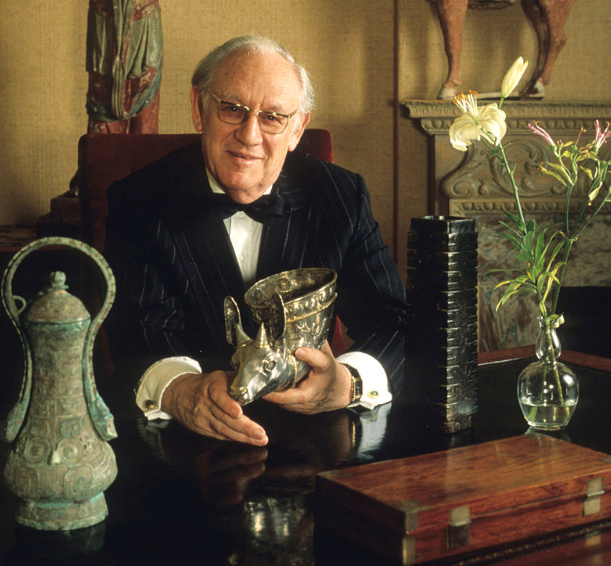States, cities, counties, school districts, and individuals all have sued the opioid industry. A lot of these have been consolidated in one suit in Federal District Court in Cleveland under what is known as Multidistrict Litigation or MDL. The judge in that case has ordered trials to begin in 2019.
Courts and law enforcement go after penny-ante street dealers, narcos, and their supply chain, and now they are going after guys like this…
This is Arthur Sackler MD of Purdue Pharma, courtesy Wikipedia.
In Cleveland, Judge Polster has ordered the DEA to turn over voluminous records of opioid transactions next week. The records, for a handful of states for 2006 – 2014, will be used to identify what drugs were shipped where by whom.
While hundreds of cases have been consolidated into this one, the Judge, Dan Aaron Polster, has no jurisdiction over many more suits that have been filed independently by individuals, employers, providers, estates, and others.
But the MDL case overseen by Judge Polster is instructive, as he is focused on not only resolving the case, but finding long-term answers to what will certainly be a decades-long struggle to deal with the harm caused by the opioid industry. His intent appears to be to help identify financial resources to help pay for that work.
From the LaCrosse Tribune:
The judge’s ultimate goal is to “dramatically reduce the number of the pills that are out there and make sure that the pills that are out there are being used properly.
“The court observes that the vast oversupply of opioid drugs in the United States has caused a plague on its citizens and their local and State governments. Plaintiffs’ request for the … data, which will allow Plaintiffs to discover how and where the virus grew, is a reasonable step toward defeating the disease,” the judge wrote in an order.
Estimates of the harm already caused and the bills that will come due are in the hundred billion dollar plus range, this for an industry that sold almost $10 billion in opioids in one year, 2015.
So, back to my question.
When is the workers’ compensation industry, a group that buys way more than 10% of the opioids sold every year, going to sue the opioid manufacturers and marketers?
We are waiting…




Joe, I can’t help but point out Arthur Sackler died in 1987
Dan – understand; in my mind he is the person most responsible for the opioid disaster.
The picture of him proudly cradling hugely expensive artifacts purchased possibly with money from opioids provides a much-needed insight.
I understand what’s going on here and yes it is good to look at all areas where this problem can be addressed. May I ask…Where is the personal responsibility? Why aren’t people suing all the alcohol companies? How many people are killed by drinking alcohol or drunk drivers? What about all the companies that produce high sugar food items? Isn’t obesity the #1 killer? What about the addiction of smart phone and how texting and driving has led to many deaths? Do we go after Apple? What about how extremely helpful narcotics have been to people who really need them? Just last night my wife’s cousin had a kidney stone and the morphine they gave her in the ER was extremely helpful. And the medication they sent her home on. To me I think the focus needs to be more on the physicians that over prescribe. Don’t they have a ton of control? Has there been just as hard of a push to go after the MD’s that over prescribe as the manufactures? With all of that said it is a horrible problem and very costly both financially and personally on peoples lives and the government. I just hope we focus on the right areas. Just my 2 cents. Thanks Joe.
Spencer – thanks for the note.
I’d suggest there’s a major difference between those entities and the opioid supply chain; the opioid supply chain knew their drug was addictive and incredibly dangerous, and pushed it on doctors to prescribe for every kind of pain.
Opioids can be very helpful in some instances, and no one is suggesting we outright ban them.
And yes, prescribers do need to be held accountable.
From a personal responsibility perspective, if your doc tells you it isn’t addictive if you have pain, and you become addicted, that’s not on you.
Joe back in my early career days when I worked in the ER — late 70-s and 80-s, the teachings were, “if people had legitimate pain, they will not become addicted. It is only those that are ‘faking’ the pain that will become addicted. So give those with ‘real pain’ all the pain meds they need”!! This is what was being taught to the med students and residents by the drug companies back then!
We should also go after the pain management MDs. Where there is demand, supply will continue. DEA should evaluate all prescriptions given to Injured workers for chronic pain above 50mg/day (of Opioids). The cost of medication and addiction due to Medical prescriptions for Opioids has continued to rise, and the cost to insurance companies continues to rise. Pain is very subjective, and physicians continue to increase the prescriptions dosages. Why not give alternative treatment for pain? What happened to I will cause no harm? These physicians have gone to the dark side.